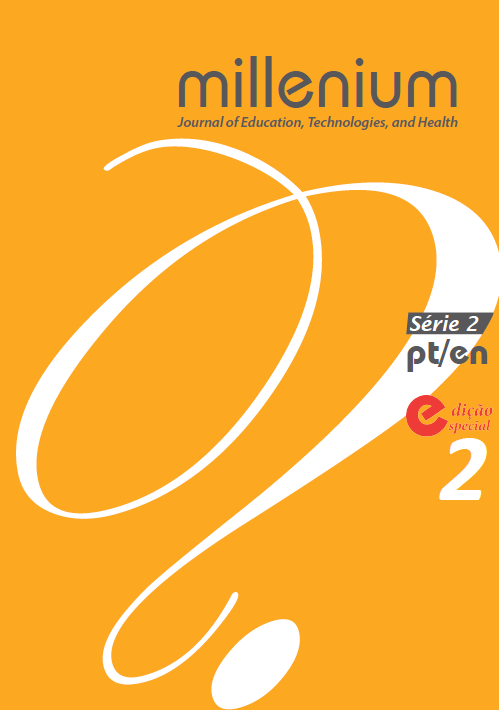Intervenção em pessoas com demência e cuidadores: Café Memória um espaço privilegiado de relação
DOI:
https://doi.org/10.29352/mill0202e.01Keywords:
café memória, demência, cuidadores, relações interpessoais, bem-estar, aprendizagensAbstract
Introdução: o Café Memória assume-se como uma estratégia inovadora em vários países da Europa e nos USA. Trata-se de um encontro com periodicidade mensal, realizado em ambiente informal e comunitário, destinado a pessoas com problemas de memória ou demência, aos seus familiares e cuidadores e outras pessoas interessadas nesta problemática.
Objetivo: o presente estudo procura apresentar evidências sobre este tipo de abordagem.
Métodos: foram recolhidos dados de caracterização dos participantes em 12 Cafés Memória de Portugal e, em apenas num dos Cafés do projeto, das mais-valias emergentes da participação nestas sessões.
Resultados: ao longo dos últimos 3 anos, foram desenvolvidas 268 sessões que contaram com 322 voluntários, 566 convidados e 1500 participantes, tendo estes últimos avaliado as sessões que frequentaram muito positivamente. As categorias que emergiram da análise de conteúdo da informação recolhida com participantes e voluntários (n = 30) apontam para valorização das relações interpessoais (86.7%); seguem-se os benefícios ao nível do bem-estar (76.7%) e das aprendizagens (56.7%).
Conclusões: os resultados apontam para a importância das relações e contactos sociais, ainda pouco valorizadas nas intervenções não-farmacológicas com estes doentes e cuidadores.
Downloads
References
Alvarez, C., & Sousa, I. (2013). Café Memória - Manual de Procedimentos. Documento não publicado.
Alzheimer’s Disease International. (2012). World Alzheimer Report: Overcoming the Stigma of Dementia. London: Alzheimer´s Disease International.
Alzheimer’s Disease International. (2015). Women and Dementia: a Global Research Review. London: Alzheimer´s Disease International.
Alzheimer Europe. (2013). Dementia in Europe Yearbook 2013, Appendix 1: The prevalence of dementia in Europe. ISBN: 978-2-9599755-7-8. Disponível em: http://www.alzheimer-europe.org/Publications/Dementia-in-Europe-Yearbooks
Alzheimer Europe. (2016, novembro). Newsletter de Novembro. Disponível em: http://www.alzheimer-europe.org/Publications/Newsletters/2016
Alzheimer’s Society. (2016). The Memory & Alzheimer’s Café UK Directory. Disponível em: http://memorycafes.org.uk/#!/search
Bardin, L. (2015). Análise de conteúdo (4a edição) (L.A. Reto, & A. Pinheiro, trans.). Lisboa: Portugal.
Barreto, J. (2005). Os sinais da doença e a sua evolução. In A. Castro-Caldas & A. Mendonça (Coord.), A doença de Alzheimer e outras demências em Portugal (pp. 27-40). Lisboa: Lidel.
Café Memória. (s.d.). O Ponto de Encontro para pessoas com problemas de memória e seus familiares. Disponível em: http://www.cafememoria.pt
Cammisuli, D., Danti, S., Bosinelli, F., & Cipriani, G. (2016). Non-pharmacological interventions for people with Alzheimer’s Disease: A critical review of the scientific literature from the last ten years. European Geriatric Medicine, 7, 57–64.
Direcção-Geral de Saúde. (2015). Portugal Saúde Mental em Números – 2015: Programa Nacional para a Saúde Mental. Lisboa: DGS. ISSN: 2183-1505.
Dow, B., Haralambous, B., Hempton, C., Hunt, S., & Calleja, D. (2011). Evaluation of Alzheimer’s Australia Vic Memory Lane Cafe ́s. International Psychogeriatrics, 23(2),246–255.
Jones, G. (2012). The TAD newsletters (thoughts about dementia). Disponível em: http://www.alzheimercafe.co.uk/Media/TAD37_AC_andothermodels.pdf
Jones, G., & Miesen, B. (2011). Dementia care: involving people in Alzheimer Cafés. Nursing and Residential Care, 13(9), 442-445.
Jones, G., Redwood, K., & Harding, J. (2008). Comparing UK and Dutch Alzheimer Cafés against new quality control criteria. Journal of Dementia Care, 16(1), 34-38.
McFadden, S., & Koll, A. (2014). Popular Memory Cafés in Wisconsin’s Fox Valley Battle Social Isolation. Generations, 38(1), 68-71.
Miesen, B., & Blom, M. (2001). The Alzheimer Cafe: A Guideline Manual for Setting One Up (Translated and adapted from the Dutch Alzheimer Society document by Gemma M.M. Jones). Disponível em: www. alzheimercafe.co.uk/Acrobat/HOW To.pdf.
Muñiz, R., & Olazarán, J. (2009). Mapa de Terapias No Farmacológicas para Demencias Tipo Alzheimer. Madrid: Centro de Referencia Estatal
Santana, I., Farinha, F., Freitas, S., Rodrigues, V., & Carvalho, A. (2015). Epidemiologia da Demência e da Doença de Alzheimer em Portugal: Estimativas da Prevalência e dos Encargos Financeiros com a Medicação. Acta Médica Portuguesa, 28(2), 182-188.
Thompson, C., Spilsbury, K., Hall, J., Birks, Y., Barnes, C., & Adamson, J. (2007). Systematic review of information and support interventions for caregivers of people with dementia. BMC Geriatrics, 7:18. Doi:10.1186/1471-2318-7-18
World Health Organization and Alzheimer’s Disease International. (2012). Dementia: a public health priority. Geneva: WHO. ISBN: 978 92 4 156445 8.
Yardley, L. (2008). Demonstrating validity in qualitative psychology. In J. Smith (Ed.), Qualitative psychology. A practical guide to research methods (2nd edition) (pp. 235-251). London: SAGE.
Yanguas, J. (2007). Modelo de atención a las personas con enfermedad de Alzheimer. Madrid: Instituto de Mayores y Servicios Sociales.
Zarit, S., Femia, E., Watson, J., Rice-Oeschger, L., & Kakos, B. (2004). Memory Club: A Group Intervention for People With Early-Stage Dementia and Their Care Partners. Gerontologist, 44(2), 262-269.
Downloads
Published
How to Cite
Issue
Section
License
Copyright (c) 2017 Millenium - Journal of Education, Technologies, and Health

This work is licensed under a Creative Commons Attribution 4.0 International License.
Authors who submit proposals for this journal agree to the following terms:
a) Articles are published under the Licença Creative Commons (CC BY 4.0), in full open-access, without any cost or fees of any kind to the author or the reader;
b) The authors retain copyright and grant the journal right of first publication, allowing the free sharing of work, provided it is correctly attributed the authorship and initial publication in this journal;
c) The authors are permitted to take on additional contracts separately for non-exclusive distribution of the version of the work published in this journal (eg, post it to an institutional repository or as a book), with an acknowledgment of its initial publication in this journal;
d) Authors are permitted and encouraged to publish and distribute their work online (eg, in institutional repositories or on their website) as it can lead to productive exchanges, as well as increase the impact and citation of published work
Documents required for submission
Article template (Editable format)





